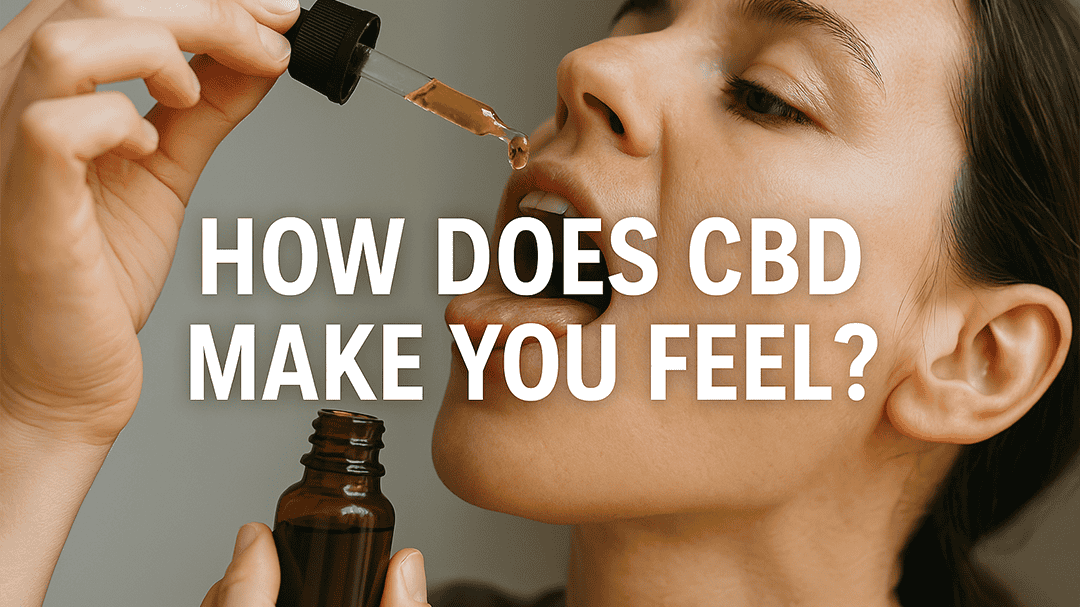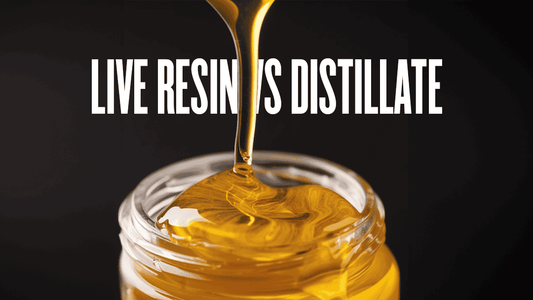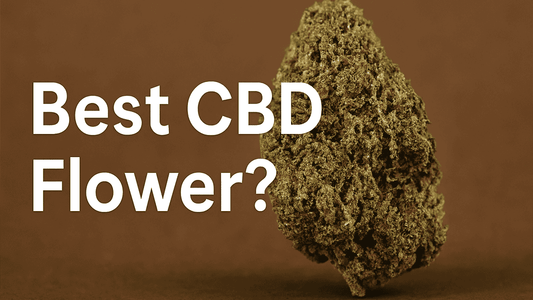You've heard the hype about CBD, but what does it actually feel like?
Whether it's a friend swearing by it for sleep or a headline calling it the wellness world's golden child, CBD has gone mainstream — fast. As its popularity rises, so do the questions. Most people know it won't get you high, but when it comes to understanding the actual CBD feeling, confusion is still the norm.
In this article, we're cutting through the noise. We'll explore the question, how does CBD make you feel, what's happening in your body when it kicks in, and why the answer isn't always one-size-fits-all. From calming experiences to subtle shifts in mood or focus, we'll unpack the CBD effects people commonly report, how it works scientifically, what dosage matters, potential side effects, and the best ways to use it — whether you're new to the scene or already browsing CBD oil options.
What CBD Is — and Isn't
Let's clear something up: CBD (short for cannabidiol) is one of over 100 active compounds found in the cannabis plant. It's often extracted from industrial hemp and used in oils, capsules, edibles, and more — but crucially, it's not the part that gets you high.
Unlike THC (tetrahydrocannabinol), which is the primary intoxicating compound in cannabis, CBD is non-psychoactive and non-intoxicating. That means it won't alter your perception, impair your coordination, or send you floating through space. Instead, CBD works in a more subtle, supportive way — helping the body maintain balance without triggering a "high." You can dive deeper into this with this clinical review on CBD's non-psychoactive nature.
The difference between CBD vs THC isn't just chemical — it's also legal. In the UK, only CBD products containing less than 1mg of THC per container are permitted for sale. That's a trace amount, far below the threshold needed to feel any intoxicating effect. For a full breakdown, check out our guide to CBD legality in the UK.
So, does CBD get you high? The answer is a confident no. But that doesn't mean it doesn't have an effect.
What CBD Feels Like: Real Experiences
So, what does CBD feel like?
For many, the answer isn't dramatic or instant — it's more like a gentle shift back to centre. Users often describe a "return to balance", known scientifically as homeostasis, which refers to the body's natural state of internal stability. By interacting with the endocannabinoid system, CBD may help support this delicate equilibrium — a concept supported in this foundational paper on homeostasis.
Common Effects People Report
While individual experiences vary, there's a handful of feelings users commonly associate with CBD:
- A sense of calm or clarity – not sedation, just a quieter mental space
- Reduced discomfort or pain, especially in cases of inflammation or tension, as shown in this 2023 clinical review
- Improved mood, possibly due to CBD's interaction with serotonin receptors (study here)
- Better sleep — whether falling asleep faster or waking less often (supporting research)
- Enhanced focus – often tied to reduced stress and a quieter mind
But here's the thing: for some people, especially when taking lower doses or using CBD proactively rather than reactively, the feeling may be subtle — or even imperceptible at first. That doesn't mean it isn't working; it's likely moving in the background, supporting your body's natural systems without shouting about it.
Why CBD Affects People Differently
If you've ever wondered why one person feels calm after a few drops of CBD while another notices nothing, the answer lies in biology and behaviour. CBD isn't a one-size-fits-all supplement — largely due to its interaction with the endocannabinoid system (ECS), a complex web of receptors found throughout the body.
The ECS helps regulate everything from mood and pain to appetite, memory, and sleep. It does this via two main receptor types:
- CB1 receptors, concentrated in the brain and central nervous system
- CB2 receptors, more prevalent in the immune system and peripheral tissues
CBD doesn't bind directly to these receptors like THC does, but instead, it modulates them — and also interacts with other pathways, such as serotonin receptors, to help the body maintain internal balance. That's the key to understanding how CBD works: it doesn't override your system — it supports it.
What Makes the Experience So Individual?
A few major factors influence how CBD feels from one person to the next:
-
Dosage
- Starting small? You may feel very little at first — and that's okay. A product like low-strength CBD oil is ideal for easing in gradually, whereas someone managing more acute symptoms may prefer high-strength CBD oil to experience faster or more noticeable effects. Like any wellness tool, the correct CBD dosage varies from person to person.
- Delivery Method
-
Body Chemistry
- Your weight, metabolism, hormone levels, and even how much water you've had all play a role in how CBD behaves in your system.
-
Underlying Health Conditions
- Those managing chronic stress, inflammation, or sleep disorders might feel the effects more acutely than someone simply taking CBD for general well-being.
The "Bliss Molecule" and CBD
Have you ever heard of the bliss molecule? That's the nickname for anandamide- one of the body's naturally produced endocannabinoids — and it significantly regulates mood, memory, appetite, and even pain.
When your body is firing on all cylinders, it produces anandamide in just the right amounts. But thanks to stress, poor sleep, or inflammation, this delicate balance can slip — leading some researchers to propose the idea of endocannabinoid deficiency, a potential contributor to conditions like anxiety, migraines, and IBS.
Here's where CBD comes in.
Rather than producing bliss directly, CBD works behind the scenes, inhibiting the enzyme FAAH (fatty acid amide hydrolase) — the very thing that breaks down anandamide. By slowing FAAH down, CBD allows more of this mood-boosting molecule to linger in your system, potentially creating a longer-lasting sense of calm and clarity. You can read more about that in this in-depth look at CBD's role with FAAH and anandamide.
There's also a serotonin connection. While not a direct replacement for SSRIs or antidepressants, CBD interacts with serotonin receptors like 5-HT1A, which may explain why so many users report improved emotional resilience or mental balance over time.
Side Effects to Be Aware Of
Let's get real — no supplement is perfect for everyone, and CBD is no exception. But the good news? CBD is well tolerated by most people, even at relatively high doses. The World Health Organization has noted that CBD has a strong safety profile and no potential for abuse.
Still, if you're wondering is CBD safe, here's what to know.
Mild Side Effects Some Users Report:
- Drowsiness, especially with higher doses or when combined with other sedating substances
- Diarrhea, often linked to taking too much too quickly
- Dry mouth — the classic "cotton mouth" sensation
- Reduced appetite in some users, though others may experience the opposite
- Lightheadedness, particularly for those new to CBD or taking it on an empty stomach
These CBD side effects are generally minor and temporary. They're also more likely to show up when using very high doses or products of questionable quality. That's why choosing reputable brands that provide lab-tested, clearly labelled products is so important.
How to Get the Best Results
If you want to experience the full potential of CBD, a little strategy goes a long way. Whether you're brand new or fine-tuning your routine, these tips can help you get the most from every drop, puff, or gummy.
1. Start Low and Go Slow
This is the golden rule — especially for beginners who want the best CBD. Before adjusting, begin with a small dose and observe how your body responds over a few days. CBD builds gradually in your system, and more isn't always better.
2. Go for Broad or Full Spectrum
Instead of isolated CBD molecules, broad-spectrum CBD contains additional cannabinoids and terpenes — all naturally present in the hemp plant. These compounds work together in what's known as the entourage effect, enhancing the overall benefits and delivering a richer, more balanced experience.
3. Buy Smart — Look for Lab Reports
Always choose a product that's been third-party tested, with clear lab reports available. This ensures the strength and purity are exactly what the label claims — and that there are no unwanted extras like heavy metals or residual solvents.
4. Don't Confuse Hemp Oil with CBD Oil
This one trips up a lot of newcomers. Hemp seed oil (used in cooking or skincare) differs from CBD oil in the UK. Real CBD oil will specify its cannabinoid content and extraction method — so always read the label and look beyond flashy packaging.
Conclusion: Calm, Not High
So, how does CBD make you feel?
For most, it's not about feeling "something" — it's about feeling like yourself again. Calm, centred, pain-free, well-rested. CBD doesn't push you into an altered state — it gently supports your body's natural rhythms, bringing you back to balance without the buzz.
Whether you're exploring CBD for anxiety, pain, or better sleep, the key is to start thoughtfully: choose quality products, go slow with dosing, and listen to your body. And as always, if you're on medication or managing a condition, consult a healthcare professional to make sure CBD is a good fit.

 4.6 Rating. Excellent.
4.6 Rating. Excellent.




